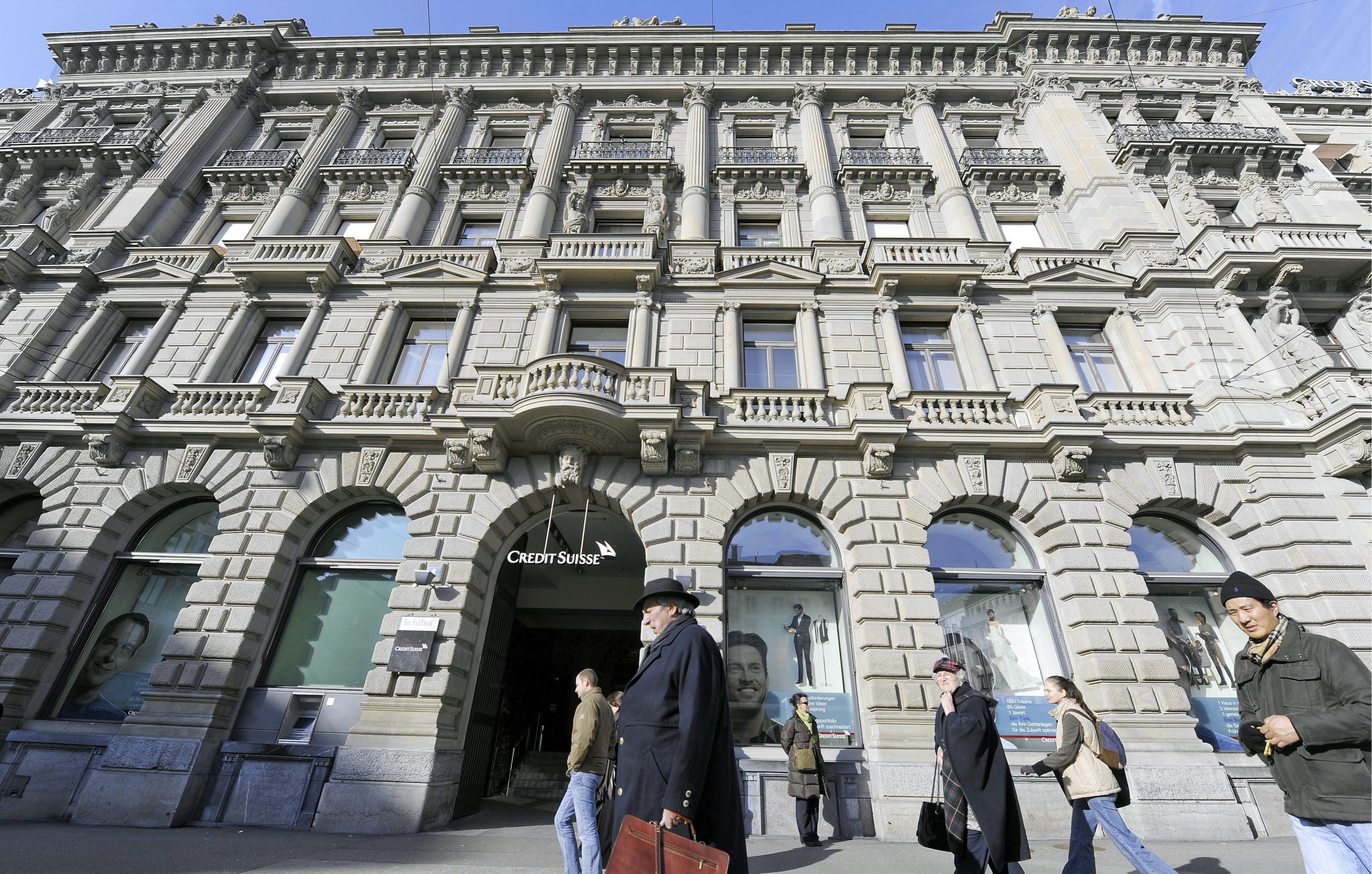When Credit Suisse’s board met to approve the bank’s forced sale to UBS in March, paintings of every bank chairman since 1856 lined the boardroom.
A lawyer from Zurich, Urs Rohner, was the last to get a portrait. Chairman between 2011 and 2021, he wasn’t there in person that day. But his tenure loomed over the proceedings. He had helped turn one of Switzerland’s most solid institutions into a tinderbox.
In the immediate aftermath of Credit Suisse’s demise, blame focused on external forces for causing the bank’s rich clients to flee, especially the panic that ensued after the surprise collapse of Silicon Valley Bank. Switzerland’s patchy financial regulation played a role too.
But insiders and investors combing over the wreckage say that Credit Suisse’s board, headed by Rohner, was ultimately responsible. It was the bearer of a flawed culture that led the bank into a series of calamities.A Swiss parliamentary commission is studying the government’s role in the Credit Suisse rescue, including its oversight of the bank’s leadership.
In a speech this week, UBS Chief Executive Officer Sergio Ermotti said Credit Suisse kicked its problems down the road and had “repeated risk-management and operational failures which undermined the credibility of its leadership and the board.”
Former executives say that Rohner didn’t set the right tone from the top to contain risks, and that he and his board resisted making sweeping changes when there was still time.
“The chairman’s track record was atrocious,” said David Herro, a partner at Chicago-based Harris Associates, once Credit Suisse’s largest shareholder with holdings of around 10%. “It was a failure in risk management. The whole thing was stacked against the shareholders,” he said.
Rohner, who currently sits on the board of drugmaker GlaxoSmithKline, said the strategy was working when he left and pointed to a ratings upgrade the bank received in December 2020. He said that decisions made after his departure created the breakdown in customer confidence.
He and other former board members rejected that the board set the wrong tone or didn’t do enough to address its challenges. Rohner’s supporters said he behaved professionally and appropriately as chairman.
“We had a strong capital base. We had a very high liquidity base. And we had functioning businesses at that time that were all performing and were profitable,” Rohner said. “We were on a path where the business could continue to be further developed.”
He said that Credit Suisse delivered more than 37 billion Swiss francs of pretax profit in his board tenure, equivalent to $42 billion, and that legacy issues costing the bank more than 12 billion Swiss francs dated from before his time.
Over 167 years, the Credit Suisse name was woven into Switzerland, Wall Street and the wealth markets of Asia and the Middle East. It represented smart solutions, a penchant for risk and Swiss discretion.
The image flipped from financial fortitude to danger on Rohner’s watch.
During his tenure, Credit Suisse’s stock lost three-quarters of its value. A series of scandals—corrupt loans in Mozambique, a rogue wealth manager who stole a billionaire’s money, the unraveling of a financing partner—culminated in Rohner’s final days with one of the biggest sudden losses in banking, a more-than $5 billion hit from the collapse of family office Archegos Capital Management.
Other banks broke with the past after scandals and losses by changing leadership. Rohner remained as one of European banking’s longest-tenured and best-paid chairmen.
Credit Suisse’s existential crisis couldn’t be steadied after he left at a board term limit. His successor, António Horta-Osório, pledged a cultural overhaul but resigned after nine months following a board investigation into his travel. The final chairman, Axel Lehmann, couldn’t see through a last-gasp restructuring.
“It’s ultimately a governance issue going back to the board of an inability to root out scandal and an unwillingness much earlier to wind down problematic units,” said Steven Kelly, associate director of research at the Yale Program on Financial Stability. “When you’re a bank, you have to cut risk early. At every scandal, they could have started the clock then,” Kelly said.
This account is based on interviews with former board members and executives and people who worked with the bank, plus public and private documents.
When Rohner became chairman in 2011, Credit Suisse’s fortunes appeared robust. The bank had sailed through the financial crisis while UBS needed a government bailout.
The Swiss lawyer cut an urbane figure around Zurich. He didn’t have a background in banking. But he impressed an earlier chairman as Credit Suisse’s top lawyer and chief operating officer in charge of compliance. Rohner’s tactic was to dispute or delay payouts in probes and lawsuits, boosting short-term profit.
As a young man, he hurdled for Switzerland at European championships, and later said he wanted to write screenplays when he retired. Former colleagues describe him as well-mannered, intelligent and an excellent lawyer.
His tenure got off to a rocky start, in what some internally thought was an overly defiant attitude toward regulators.
In 2012, Switzerland’s central bank blindsided Credit Suisse with a public call to quickly raise capital. Rohner fought back in a statement. The board was comfortable with the bank’s health. Weeks later, Credit Suisse did as the central bank asked.
Around the same time, U.S. prosecutors stepped up a criminal probe into how the bank helped Americans conceal untaxed assets. UBS swiftly cooperated in a similar case in 2009 and paid a $780 million fine. Rohner and the bank’s lawyers stalledand prosecutors said the bank gave only partial information.
The gambit backfired. Credit Suisse was criminally convicted in 2014 for conspiring to aid tax evasion, paying $2.6 billion. Justice Department prosecutors said the bank’s inadequate cooperation and delays spurred the government to force the bank into a guilty plea.
Rohner, who headed legal and compliance during some of the alleged criminality, said he was personally clean in the matter. The bank blamed a small set of employees.
“We have a zero-tolerance approach to misconduct,” the chairman said at the 2015 annual meeting.
The bank’s CEO at the time, Brady Dougan, left not long after the bank’s guilty plea. Rohner stayed.
His fellow directors included a Harvard professor studying workplace gender equality and a former inventor at Google. His vice chairman was the CEO of drugmaker Roche. A Qatari royal joined for a while, as did the son of a former Credit Suisse chairman.
Few had any experience at a large global bank, but their pay could be more than $1 million a year. Perks included invitations to horse racing on snow in St. Moritz and leadership sessions with brand ambassador Roger Federer.
“It was clear that the chairman and other board members did not have the right skill set,” said David Samra, founding partner of the Artisan Partners International Value Team, which briefly invested in Credit Suisse after Rohner’s departure.
Rohner recruited Tidjane Thiam, the CEO of U.K. insurer Prudential, to take over from Dougan. The Ivory Coast-born executive was a nonbanker, but the idea was he would pivot Credit Suisse to help manage the wealth of Asia’s burgeoning rich.
In his first days, Thiam was briefed that the bank needed $10 billion or more for legal settlements stemming from lax controls. It badly needed capital, with less than 3% equity to total assets. Thiam felt he was misled into being Rohner’s cleanup guy and presented net losses for three years.
Rohner told shareholders that Credit Suisse needed to evolve, but with the utmost care. He quoted from Giuseppe Tomasi di Lampedusa’s novel “The Leopard” about the compromises of a fading aristocratic family: “If we want things to stay as they are, things will have to change.”
The new CEO hired hundreds of compliance officers and set up a conduct and ethics panel to assess transgressions. He reviewed client lists and ejected tens of billions of dollars from customers who raised red flags.
Relations chilled between the chairman and CEO. Ushers on Credit Suisse’s second-floor executive suite learned to station their meetings in different areas.
Thiam’s compliance net closed in on informal bank practices—including the chairman’s. Rohner was close to the bank’s Qatari shareholders. Some royal family members were clients, and Rohner wanted their margin calls waived on loans, according to former executives with knowledge of the request. Bank executives said no.
A person close to Rohner said he never asked for margin calls to be waived.
The chairman introduced a client to open an account, a billionaire he had met at an Eden Roc resort. According to the former executives, the account might have been approved previously, but compliance employees rejected it.
Something else interested new compliance managers. Credit Suisse was the main sponsor of the Zurich Film Festival, co-founded by Rohner’s partner, Nadja Schildknecht. The chairman appeared with her and Hollywood stars. Some employees in compliance thought it put the bank in a tricky spot, a conflict of interest. Rohner said he wasn’t involved in the sponsorship decisions. The sponsorship of the festival continued.
Other perks were questioned by executives. Rohner told a guard at Credit Suisse’s headquarters to let a friend of his, a former bank board member, use its coveted employee parking in central Zurich. Thiam’s chief operating officer found out and said no, it was against the rules. Rohner asked the COO, Pierre-Olivier Bouée, to think about the request carefully.
In mid-2019, Bouée balked at a plan by the chairman to fly the bank’s supervisory and executive boards and spouses, around 50 people, to New York that fall to celebrate the bank’s restructuring. Bouée, in charge of the bank’s costs, thought it was extravagant. The celebration went ahead.
That summer of 2019, Credit Suisse’s most promising young executive, Iqbal Khan, left for UBS after a personal dispute with Thiam. Khan had moved into the house next to Thiam’s in an exclusive suburb, and their partners argued about trees affecting sight lines to Lake Zurich.
The departure had the potential to destabilize Credit Suisse’s international wealth-management unit, which Khan led. To keep him from leaving immediately, Rohner agreed to cut his break period from six months to three, unusually short for a senior executive heading to a rival.
Bouée worried Khan might poach clients or staff and had him followed by private detectives. Khan spotted one, and the spying made international headlines. An intermediary who hired the investigators killed himself.
Rohner said the spying was unacceptable, and not part of the bank’s toolbox. Thiam said he had no knowledge of the spying. The financial regulator later found that the bank ordered spying at least seven times between 2016 and 2019.
That October, a senior bank executive filed a whistleblowing complaint. The executive claimed that the bank had Thiam followed around London before Rohner hired him, and that the executive got the information from a senior human-resources employee. When interviewed by bank-hired lawyers, the human-resources employee denied having discussed the alleged spying. The lawyers didn’t find evidence it happened.
Thiam wasn’t interviewed by the lawyers but suspected he was surveilled.
While the spying scandal raged, Rohner invited Thiam to his 60th birthday party. The entertainment included a Black performer with a broom. Thiam felt it was a message that he was handling Rohner’s messes. Rohner had no say on the entertainment, according to a person familiar with the evening.
Nevertheless, the bank was in profit again. Asia growth was back on the table. Herro, the Harris Associates partner, and two other investors called for Rohner to back Thiam or resign.
Instead, Rohner and the board asked Thiam to leave in February 2020, without a handover.
Herro said he considered selling the stock then, but knew Rohner would soon hit a term limit.
“It was only one more year,” Herro said. “What could happen?”
—Patricia Kowsmann contributed to this article.
Write to Margot Patrick at margot.patrick@wsj.com



